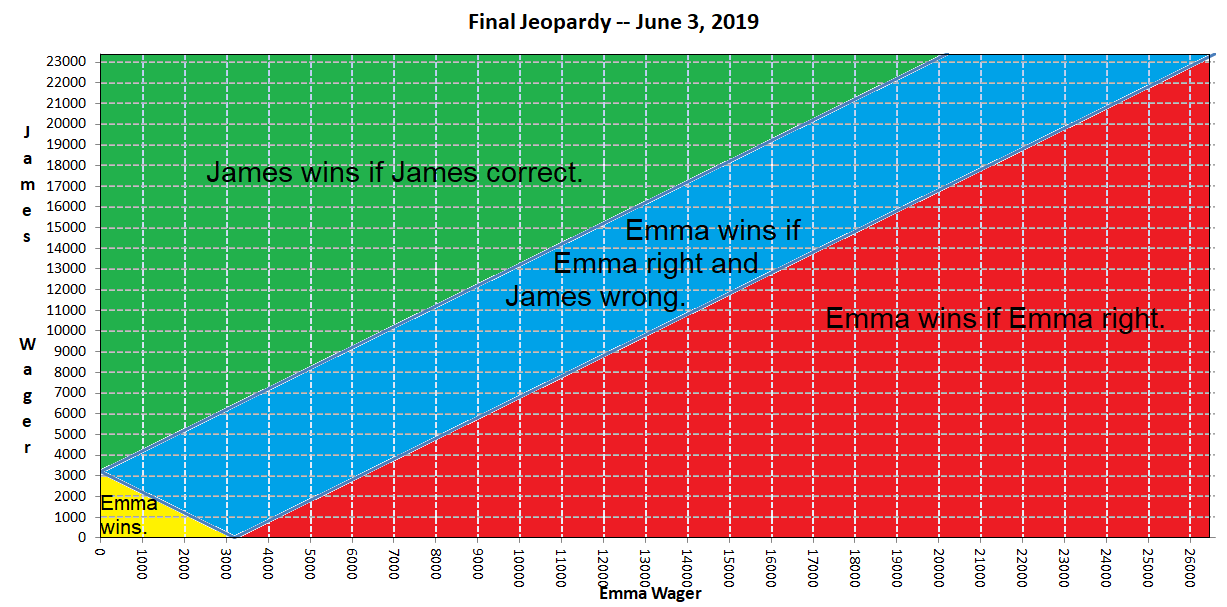Analysis of June 4, 2019 Jeopardy -- 6/6/2019
The most active thread on the Wizard of Vegas forum since Monday has been about Jeopardy contestant James Holzhauer and his loss on Monday's show.
To set the stage, after 32 shows, James had won $2,464,216. His average win per show up to that point was $76,944. The all time Jeopardy winner, Ken Jennings, has held the record for years at $2,520,700. James was $58,484 short, which was less than his average daily win. Alex braced the audience at the start of the show for a possible new money champion to be crowned. Between James and that goal were two new contestants, including Emma Boettcher.
Emma employed basically the same strategy as James. Searching for the Daily Doubles early in the harder, higher value, questions and being aggressively wagering them in them. The first Daily Double was found in the very first clue, by James, who was limited to a meager wager of $1,000, per show rules. The second was found by Emma, who, in the style of James, bet all of her $7,600 at the time. She went onto find the third while modestly ahead and wagered $3,000, which I would argue was too conservative, especially against James.

This picture shows the scores when Emma found the second Daily Double, in which she correctly went "all in," as James liked to put it when often did.
In the end, here were the scores going into Final Jeopardy:
- Emma $26,600
- James $23,400
- Jay $11,000
In this kind of situation where the second place player has more than half the first place player, the leader typically bets enough to lock in a win if he/she is correct. This wager is 2*x + 1 - y, where:
- x = second place score
- y = first place score
That is exactly what Emma did with a wager of 2*$23400 + 1 - $26600 = $20201.
James correctly predicted that Emma would wager big. His choices were:
- Bet big — Path to win requires Emma being wrong and James being right.
- Bet small — Path to win requires Emma being wrong.
If we assume Emma does bet big, a small wager is the obvious right choice as it necessitates only one condition to win, Emma being wrong. Assuming Emma did bet $20201 and was wrong, she would have $6,399 left. So a small wager could be anything from $0 to $17,001. What James did was use the 2x+1-y formula to stay above Jay as long as James was right.
Let me pause here. My forum is ablaze with claims that James made a terrible low wager. Some go onto say he took a dive so that Ken Jennings could remain the Jeopardy money-winning champion. Why would he do that, you may ask? As the conspiracy theory goes, the producers already have Ken Jennings as their first choice to replace Alex Trebek, with a sense of urgency to pick someone in the face of Alex's pancreatic cancer. The believers in this theory claim James must have been paid off enough to motivate him to lose deliberately.
Let me state unequivocally that I believe this theory to be a flaming bag of dog poop. James played that game exactly as he should have. He lost because of a combination of these reasons:
- Emma was a very strong player in terms of both knowledge and strategy.
- Emma had amazing timing with the buzzer, for a new player.
- Emma found both of the key Daily Doubles, wagered big on the first won, and got both right.
- Emma got Final Jeopardy correct.
His low wager was exactly what he should have bet. It was easy to predict that Emma would wager high. His best shot was to go low and hope she got it wrong. If he bet big he would have had to count on both Emma being wrong and himself being right. Historically speaking, when the first place player is wrong, the second place player is also wrong 61% of the time (going back four seasons).
The following table shows under what conditions Emma would win according to both her score and James. This shows that if James predicated Emma would bet big, his best chance is to be in the red zone, where he needs for her to be wrong only, as opposed to the blue, where he would also have to be right.

I plan to write an article going over this more carefully. For now, I just want to absolutely say that James low wager was not only correct, but also the right amount to claim second place if both Emma and James were correct, which is what happened. Second place wins $1,000 more than third.
In closing, I would like to congratulate Emma on beating Goliath and James on an outstanding run.




